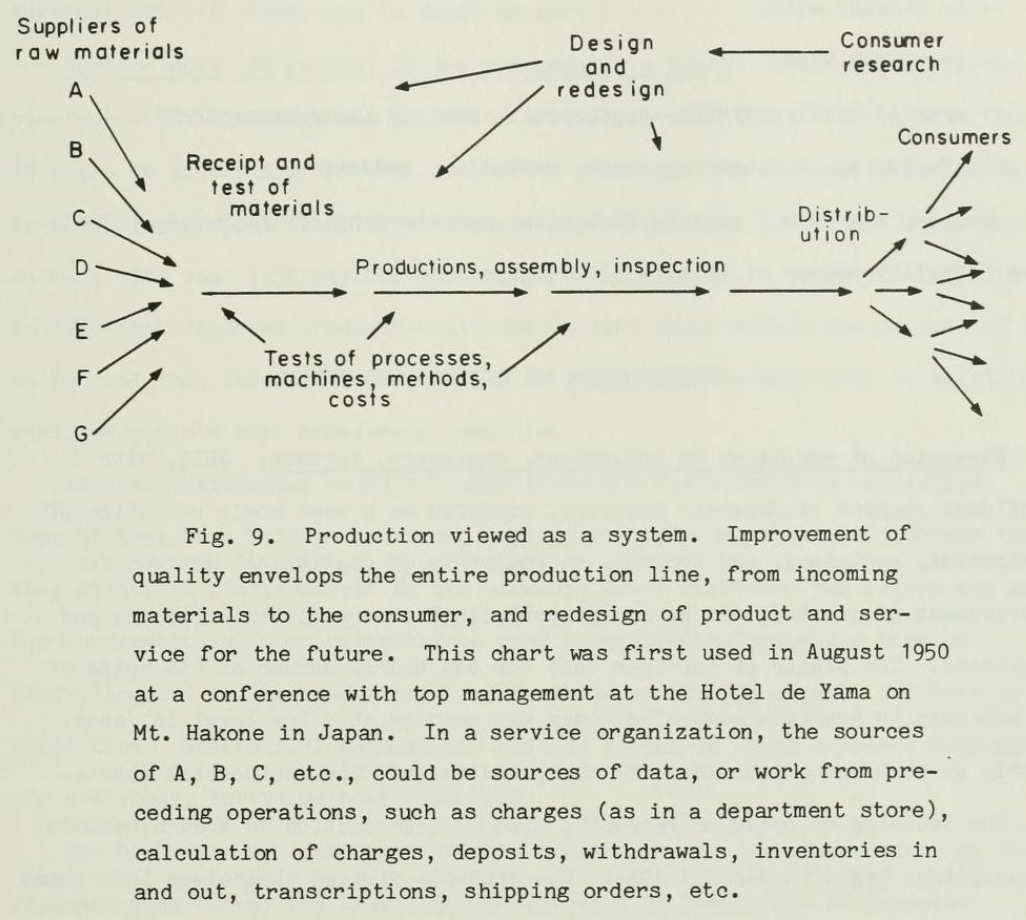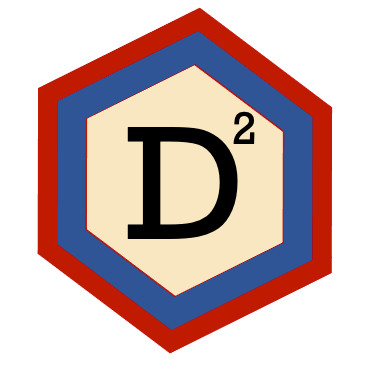WELCOME ONCE AGAIN to our weekly series, Doctor’s Orders, where you pose your questions about Dr. Deming’s management theory and philosophy, or anything Deming-related, and I do my best to find you the answers!
Today’s post will be a short as it is about one of those questions that should be entirely self-evident and easy to answer, yet is surprisingly not. I’ve done my best to answer it, but I find I’m not entirely satisfied.
It comes to us from Martin C. who asks:
Since you posted about Deming’s links to pragmatism and systems thinking I wanted to ask what you believe are the systems thinkers that influenced Deming?
For example he was a contemporary of Ludwig Von Bertalanffy but older than Russ Ackoff. So I’m wondering who would have been a greater influence?
Q6: Who influenced Deming’s view on systems?
Great question Martin! This is a meaty one, and for me it has to begin with this diagram from Deming’s forerunner to Out of the Crisis: Quality, Productivity, and Competitive Position, showing us the nascent systems perspective of a manufacturing business:
This is the diagram Deming used to ignite the Japanese Miracle in August 1950: it tells us his thinking in systems was, at the age of 50, relatively well-formed, and pre-dates Bertalanffy’s 1954 founding of The Society for General Systems Research, which can be considered as the point of origin for what we know of as systems thinking today.
So, perhaps we need to look earlier to his mentor, Dr. Walter Shewhart.
The history here is quite clear: Deming met Shewhart in 1927 who transformed his thinking and world-view in three profound ways over the course of their close working relationship:
First, by Shewhart’s theory on causes of variation in a process and the two mistakes managers make in reaction;
Second, by Shewhart’s Statistical Process Control Chart for visualizing variation in a process to determine whether it was stable and under statistical control;
Third, by Shewhart’s theory of knowledge, inspired by C.I. Lewis’ The Mind and World Order, which would form the basis of the PDSA cycle (Trivia: Deming read that book over fourteen times before grasping its implications)
Note that Deming used the words process and system almost interchangeably, and I think this also originates with Shewhart’s influence in how he described sa proto-systems view of production, ie. “systems of unknown or chance causes” that were at play in mass production, itself. We can see this throughout Shewhart’s 1939 book, Statistical Method from the Viewpoint of Quality Control, for which Deming wrote the Foreword.
So, case-closed: it seems neither Bertalanffy nor Ackoff were competing influences for Deming’s view on systems, it was Shewhart all along. Well, maybe.
In re-reading John Willis’ recent book, Deming’s Journey to Profound Knowledge, I was reminded of an interesting passage he wrote about Bertalanffy:
Supported by the Rockefeller Foundation, von Bertalanffy studied in the US with a theoretical physicist at the University of Chicago and then at a marine laboratory about seventy-five miles south of Boston before Hitler annexed his homeland of Austria in 1938. Despite attempts to stay in the US, he was forced to return, whereupon he promptly embraced Nazi ideology.§ Just before he left, however, he gave a lecture wherein the audience included one Russell Ackoff and a W. Edwards Deming, who was still teaching at the USDA Graduate School.
Willis, John. Deming's Journey to Profound Knowledge (pp. 120-121). IT Revolution Press. Kindle Edition.
Interesting, no? The lecture Bertalanffy would have given at that time was probably about the nascent beginnings of his General Systems Theory that he’d go on to develop after the war, which emphasizes seeing the world as interconnected wholes rather than individual parts, with changes in one part affecting others, and how broadly this applies to living organisms and organizations — very in simpatico with Deming’s later thinking in the 1980s.
Now, this said, if an event was pivotal to his learning, Deming would write about it, as we see Shewhart mentioned in his books, and also about hearing Genichi Taguchi present his paper on the loss function in 1960, or Lloyd Nelson’s observations on “unknown and unknowable” consequences from disappointing or delighting a customer. We don’t have anything, that I’m aware of, which is similar about Bertalanffy, either from the lecture in 1938, his work after the war or founding The Society for General Systems Theory in 1954.
What of Ackoff, then? He warrants a mention in The New Economics, likely as a result of their meeting in the 1980s for an interview on systems thinking in education, in particular Ackoff’s allegory of an automobile made of all the best parts not working as a system because the parts wouldn’t fit. Ackoff did have some impact in helping refine Deming’s thinking in this regard.
So, going back to your question, who had the greater influence: Bertalanffy or Ackoff. I think the contest would actually go to Shewhart first, with later enhancements from Bertalanffy and Ackoff, among others, as he was developing his theory of management from the 14 Points to the System of Profound Knowledge. But it’s still a mystery for me when I consider the full arc from 1950 to 1980. It’s obvious systems thinking was an important part of his theory, but I’m not totally satisfied with my conclusion, here. More research needs to be done!
Thanks for this question, Martin! It was a fun rabbit hole to tumble down, and it’s given me a new mystery to unravel alongside a few others. I’m always learning something new. Let me know in the comments below whether I’m over the target with this answer for you!
Related Posts
The Parts Wouldn’t Fit (Aug 20/21)
What Do You Think?
Did I get it right? Are there details you think I’ve missed? History or factoids you know that could fill in the blanks? Let me know in the comments below or via our Chat thread for this AMA. And, as always, keep an eye out for a Chat link next week where you can post your questions for the next instalment!





Hi Chris, I am finally at the point of starting to read C.I.Lewis' book "Mind and the World Order". It is not an easy read so don't expect any immediate update or revelation. At the same time I am also doing the 12 Days to Deming course designed by Dr Henry Neave and have Dr Jackie Graham as a tutor. Jackie worked with Dr Deming in the last 4 years of his life so her insights into what he did and thought are remarkable and so valuable. Plus I have recently read Henry Neave's book "The Deming Dimension" and am starting to pull some of the threads together.
You have indulged me wonderfully thus far so let me attempt to distill these learnings (I feel a little like Harry Potter the first time he witnessed Dumbledore extracting thoughts from his Pensieve).
C.I.Lewis is sometimes labelled the founder of Conceptual Pragmatism. As far as I understand him his philosophy advocated for language and thought as tools for prediction, problem-solving and action. This is very aligned to Deming's teachers. However there is another aspect here. In following pragmatism, C.I.Lewis was also following Charles Sanders Pierce. One of his proposals was to augment deductive and inductive reasoning with abductive reasoning. The significance of this is seen in a new of fields today like design thinking, innovation. The possibility that there are many likely answers. This gels well with Deming's work on variation and Lloyd Nelson's observation on "knowable and unknowable numbers".
Another thread I am pulling at is the relationship with Russ Ackoff. In later life Deming and Ackoff appear in a number of interviews, lectures and videos together. Mostly they are in broad agreement. Ackoff even appears in a number of Deming Institute videos after Deming's death to discuss his work. In some of Russ Ackoff's work he describes a taxonomy of systems (mechanistic, biological, social and ecological) and this matches (approximately) S.C.Pepper and his World Hypotheses (published in the 1930s) plus it leads to some social and ecological science from the Tavistock Institute. Eric Trist and Fred Emery are some of the proponents I am interested in.
Where the Tavistock work is interesting is that it takes the work of Kurt Lewin (on your chart as an influence to Ackoff) and translates this into several social science theories. The one I am most interested in is Fred Emery's Open Systems Theory. Emery, I believe, fills in the external vs internal motivator aspect of SoPK quite nicely. Knowing that Ackoff and Emery were collaborators (they compiled one of the best Systems thinking books together) and that Ackoff and Deming were friends or colleagues, leads me to think that OST might have a role to play in the evolution of SoPK towards psychology, sociology and human factors in work.
I will leave it there for now. There is much more to explore. We can stand on the shoulders of giants if we wish to.
Thanks Chris - appreciate you helping me with this rabbit hole!!!